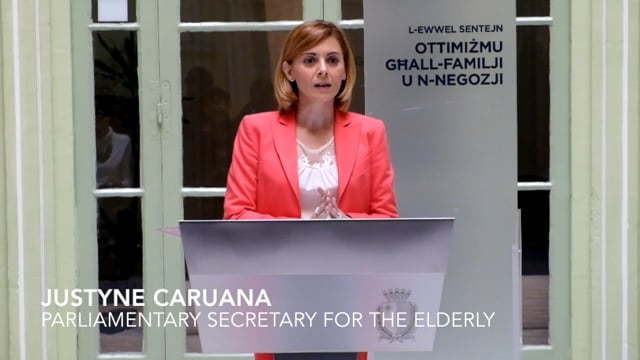6,071 people diagnosed with dementia in Malta in 2015
Parliamentary Secretary for the elderly Justyne Caruana launches the National Dementia Strategy




“This strategy has the central aim of changing the way we look at and deal with Dementia,” said Dr Charles Scerri, the National focal point of dementia, at the launch of the strategy earlier today.
"Malta is the 21st country in the world, and the smallest country to launch a National Strategy for Dementia," Scerri explained.
Scerri said that the condition has affected some 44.4 million people worldwide in 2013, and it is expected to effect around 135.5 million people by 2050. He added that a diagnosis of the condition is made every four seconds globally, but that around 50% of sufferers are not actually diagnosed.
Scerri added that locally, the condition affected 6,071 people in 2015 and it is expected to effect around 13,000 people by 2050.
“Education and awareness is one of the aspects the national strategy will deal with,” Parliamentary Secretary for the elderly Justyne Caruana explained.
“The strategy looks at distributing various booklets, that have already been printed, both for patients and for carers, and it also focuses on training professionals to better treat the condition and give as early a diagnosis as possible,” Caruana said.
Scerri presented journalists at the events with figures to explain how the condition is one of the most expensive conditions at the moment.
“Dementia cost the world $604 billion in 2010; which amounts to around 1% of global GDP, and the figure is estimated to rise to over $1 trillion by 2030,” Scerri said.
Caruana explained that although the strategy was being launched today, some projects had already begun including new Day and Night Centres, as well as various helplines.
“The strategy includes 85 recommendations and around six lines of intervention, including raising awareness, better diagnosis, more training, dealing with the condition ethically and increasing research and analysis into the disease,” Scerri explained.
Caruana pointed out that the strategy had been discussed with 80 different countries present at the first ministerial conference about global action against Dementia in Geneva a few days ago.
“The government has taken the challenge to fight this disease and it has established a realistic timeline of nine years for the implementation of the strategy,” Caruana said explaining that it would involve changes in the infrastructure as well as a focus on human resources.
Caruana added that every effort was being made to ensure that those who work in the sector would be informed with the latest and most effective methods to deal with the condition.
“We have also just published calls for the first Dementia Intervention team in the country, which entails health professionals going out in the community to help patients and carers,” she said reiterating the importance of changing the stigma surrounding Dementia.
Caruana said that Malta was the first country in the world to publish a Dementia-friendly strategy in a Dementia-friendly manner that is designed to be understood by patients themselves.
Referring to criminologist Saviour Formosa’s suggestion that dementia sufferers could be electronically tagged for their safety, Caruana said that such an idea would imply discussing ways of making it more respectful of the sufferer’s dignity.








.jpg)




.jpg)






.png)


